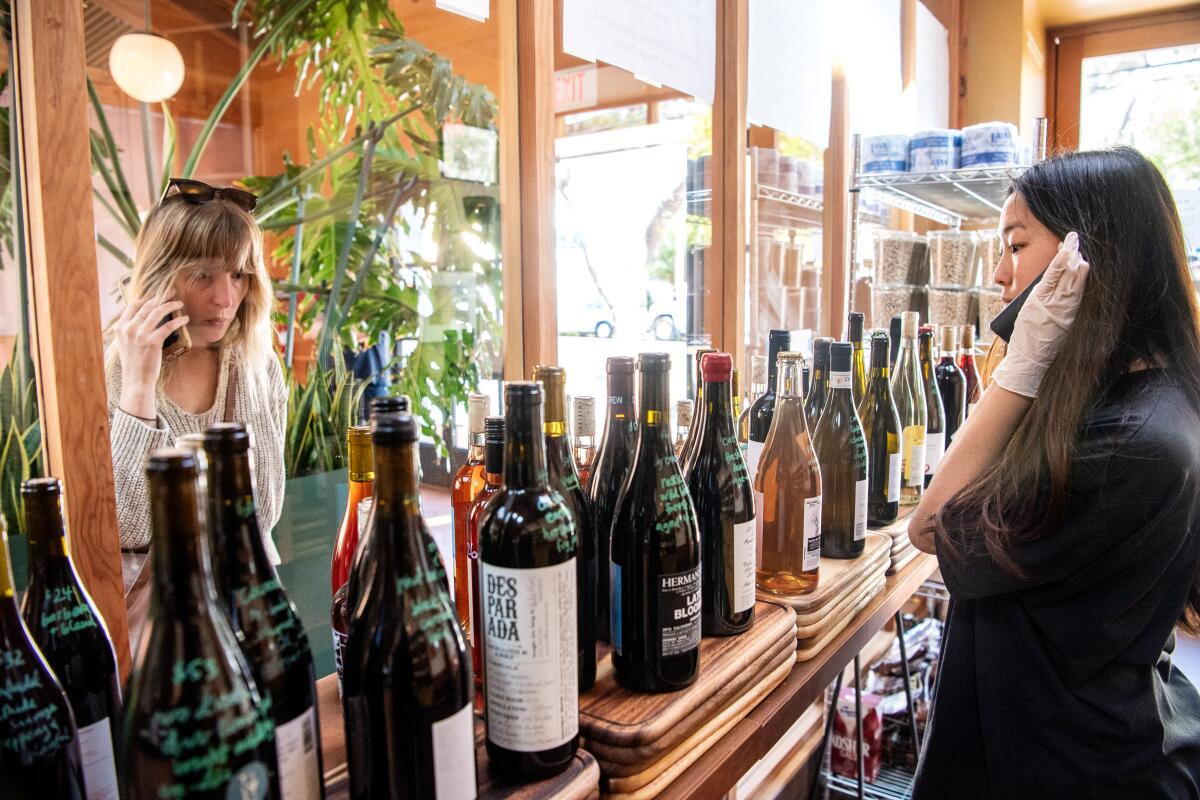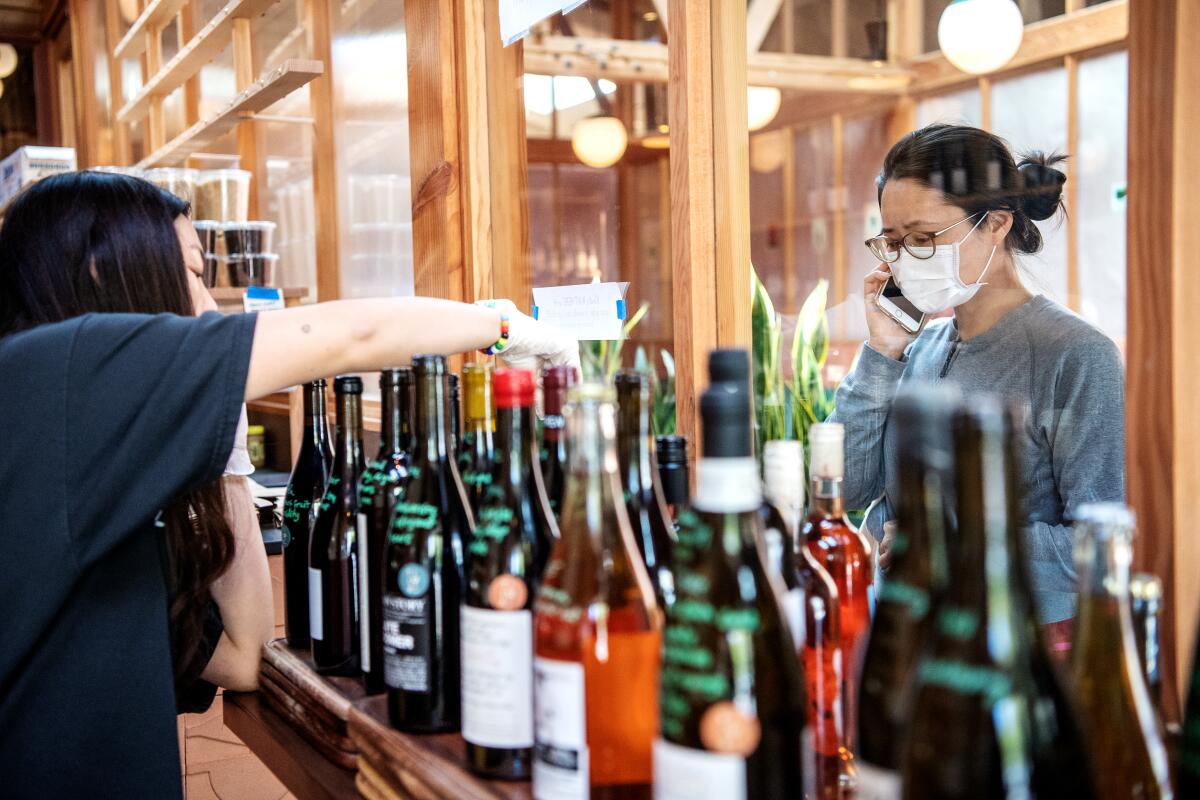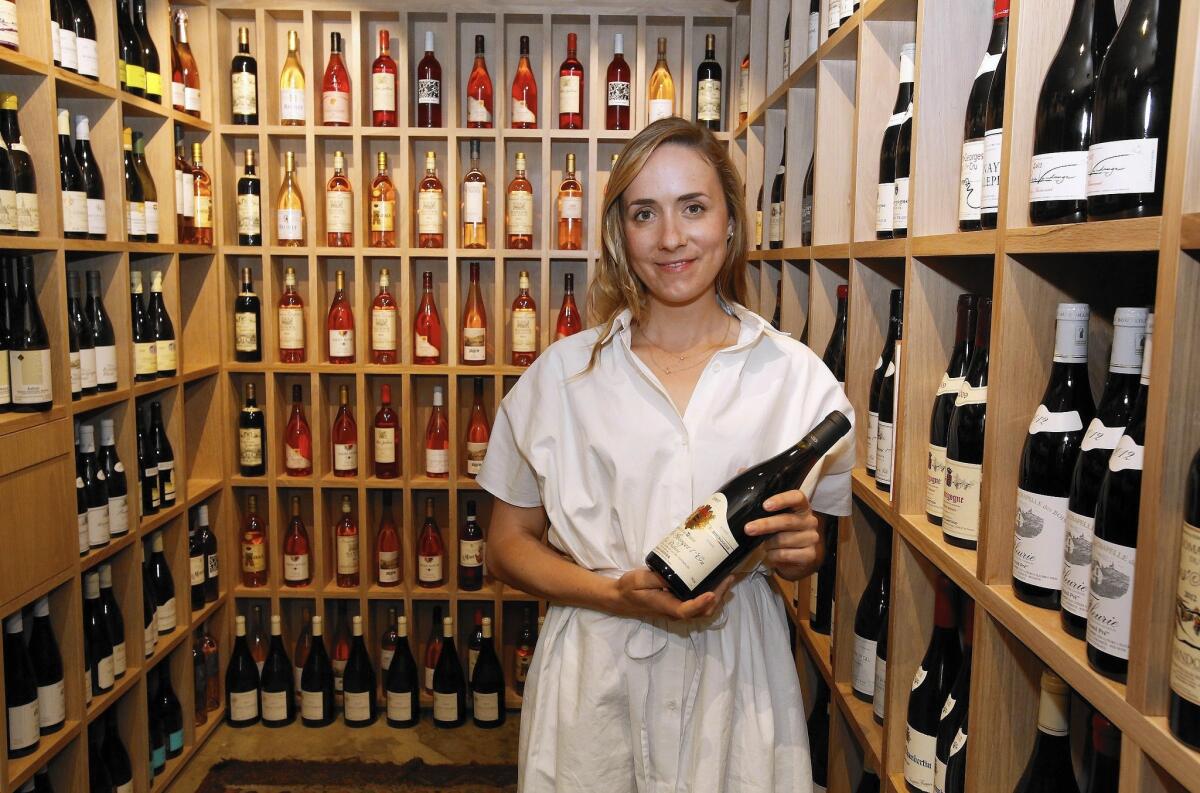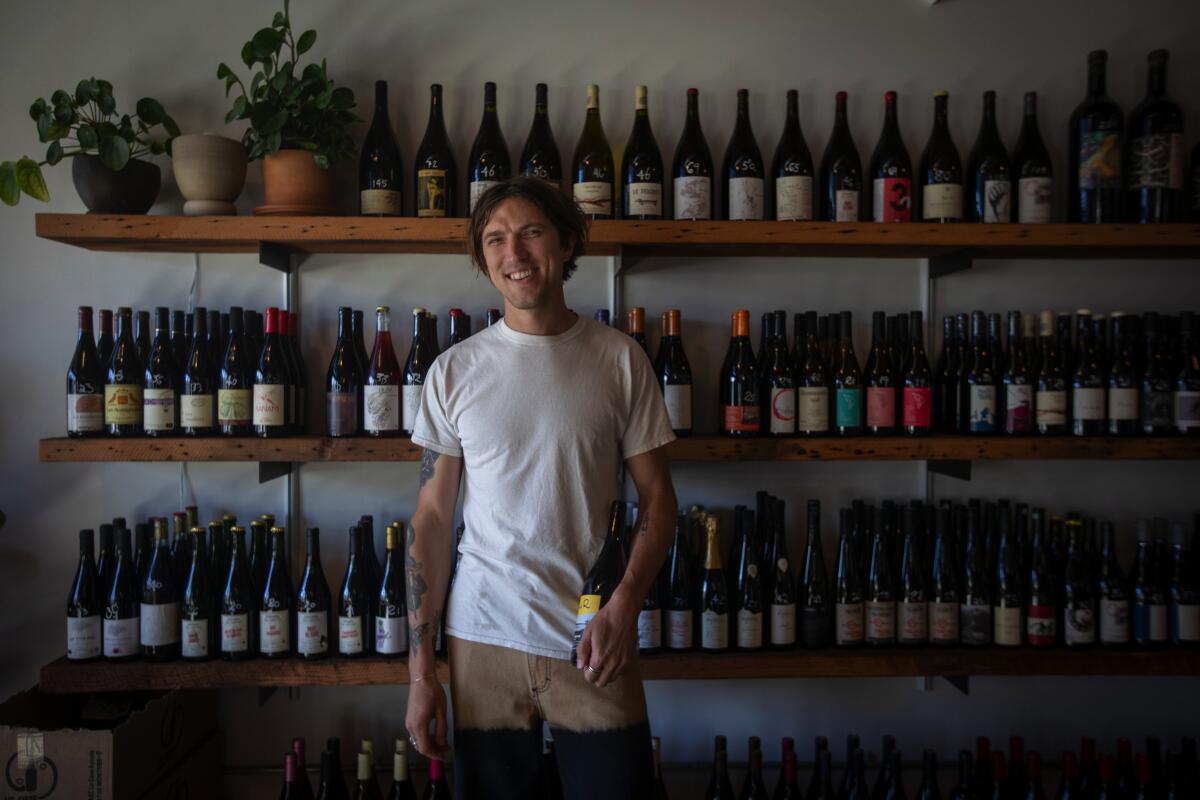How do L.A. wine shops keep business flowing during a pandemic?

- Share via
“Call 213-995-6090 for a good time,” reads the strip of paper affixed to a glass wall with blue painter’s tape. It’s the smallest in a series of directive signs posted outside Tilda, a wine bar and shop in Echo Park, where employees strive to evoke an element of human connection in the contactless buying experience they’re offering.
The unexpected luck of Tilda’s design — the clear wall separates an enclosed atrium from the shop and its inventory — allows for some welcome face-to-face interaction during the coronavirus outbreak. People call into the shop one at a time to talk through their order, peering through glass at a lineup of three dozen or so natural wines. There’s an aromatic, auburn-colored blend called Meditazione from Long Island, for example, or a deep-strawberry rosé made by Say When winery’s Rachel Silkowski, who lives nearby.
A lone employee tends the store. Phone in hand, he or she answers any questions, smiling and making frequent eye contact from the other side of the transparent barrier.
Customers hang back until the purchase is placed on an isolated table with sterilized pens to sign the receipt; they’re on their way in less than five minutes.
“It’s a little weird and a little fun at the same time,” said Claire Goldberg, who drove from Sherman Oaks on Thursday afternoon to shop at Tilda. “For both my husband and me, wine is a reward at the end of the day during this time.”
Under the current shelter-in-place restrictions, customers can no longer enter wine shops; instead, owners are working out how to best bring their shops to the people. On March 19, California’s Department of Alcoholic Beverage Control temporarily eased regulations, allowing restaurants, bars, and wine and liquor stores to sell via carryout and delivery.

Wine merchants in Los Angeles are pivoting hard to respond to the churning, ever-changing demands of the moment. They’re organizing online meet-ups and increasing social media engagement, announcing curbside service and creating sudden presences on delivery apps.
“I see so many creative ways that wine shops are staying alive,” Goldberg said. “It feels good to do something to help small businesses.”
Tilda has an expanding selection of provisions; the 29-year-old menu developer also bought bread and olives as well as three bottles from WonderWerk L.A. so she could join Tilda’s a private virtual tasting with the winemakers on Sunday.
Businesses are devising distinct ways to reach their audiences — there are plenty of thirsty imbibers sheltering during a pandemic — while still trying to retain the character that gives each place affableness and heart.
Esters Wine in Santa Monica has marked down all its bottles 25% and will assemble a “Quarantine Essentials” package including six staff-favorite wines and nibbles. Costa Mesa’s Argaux — an online shop that offers pickups by appointment and temperature-controlled wine storage — compiles a “Quarantine Edition Blind Tasting Kit” available for free delivery through Postmates in Orange County.
Lou Wine Shop in Los Feliz sends out a daily newsletter listing the inventory it has in quantity, with a handful of well-articulated picks du jour from owner Lou Amdur. (Describing a René Mosse Chenin Vin de France 2018, he writes, “From our favorite Loire curmudgeon, picture-perfect Anjou blanc, crunchy, apple-y and dry.”)

Helen Johannesen, proprietor of two tiny but mighty stores, rolls out topical commentary on Helen‘s Wine’s Instagram stories while packing pink-and-white delivery boxes. “The hand chap. It’s real,” she said on Friday, wagging her fingers at the camera.
Tilda opened its bar and shop in February. The Echo Park community had been watching the renovation of the 1928 building by owners Jason Goldman and Christian Stayner for months; neighbors immediately filled its scrunched seating area and crowded around its standing-room-only counter. Goldman and Stayne transitioned to retail-only before the March 15 restaurant shutdown.
The particular appeal of Tilda’s current interactive setup speaks to the enduring relevance of wine shops in the digital age: Wine is an obscure, overwhelming subject for most of us. We crave guidance. We want our heads buzzing with knowledge and narratives delivered by an actual soul, even if we won’t retain it all.
Coly Den Haan — co-owner of Silver Lake’s Vinovore, which focuses on women winemakers — misses the in-store communication. “It’s spring and all the new wine releases are coming out,” Haan said. “We’re trying to tell people about the cool new stuff. It’s difficult. If they were in the shop to browse, we’d just tell them about it.” To personalize shopping, every online wine listing includes a picture of a handwritten shelf-talker: Phrases like “A day at the beach in a bottle” and “Rich, stunning and will age with grace like Michelle Pfeiffer” written in slanted cursive help connect the pixels to a person.
On Wednesday I stood outside Psychic Wines, less than a mile from Vinovore, and called the number posted on its door; Zach Jarrett, one of the store’s three owners, answered. I told him I was looking for a wild orange wine and a balanced Old World-style red.
In his burbling stream of a voice, Jarrett told me about the mavericks of Sete Winery making audacious natural wines in Lazio, a region of Italy where the viniculture mostly produces basic table wines for Roman trattorias. It tastes of herbs and smoky pineapple, he said. Then he told me about Domaine Leon Barral in the Languedoc-Roussillon region of France. Jarrett said the family resisted industrialization techniques in the 1980s when the wine industry was exploding globally; they wanted to be farmers still, he told me, and the wine “captures the elegant grace of the woods.”

I listened like a child mesmerized during story hour, and then I read him the numbers of my credit card.
In a follow-up conversation, Jarrett echoed the feelings of other wine shop owners I spoke with: They’re slammed; out of a staff of five, the owners bumped their two part-time employees (both restaurant workers) to full-time positions. But uncertainty’s heavy clouds hover over the busyness.
“Will the momentum sustain itself?” Jarrett asked. “We can’t know what the short- and long-term looks like. We’ve had repeat customers, but what if the shutdown drags on and customers begin to run into an income wall? When we’re through with over-buying at grocery stores, if we begin enduring in a new reality kind of way, how will that impact our little store? Food is an essential need. Wine isn’t.”
Randy Clement doesn’t have time for such reflections. He’s currently operating three businesses full-throttle: Silverlake Wine, Highland Park Wine (attached to the restaurant Hippo) and Everson Royce Wine & Spirits in Pasadena. (A fourth venture, Everson Royce Bar in the Arts District, is closed for now.)
He opened Silverlake Wine with partners in 2003. His crew is averaging 90 seconds on the phone per order, he said. Many customers don’t even ask for specific recommendations. “A wine shop is built on the ethos of, ‘What’s next?’ Answer that question long enough for a community and it starts to trust you.”
Still, I asked him what’s hot right now. He gave me the same reply as other boutique wine shop owners: natural wines and especially orange wines, those boldly acidic white grape varietals in which the skins have been left to ferment with the juice.
“It’s the great metaphor of spring 2020,” Clement said. “People want skin contact.”
More to Read
Eat your way across L.A.
Get our weekly Tasting Notes newsletter for reviews, news and more.
You may occasionally receive promotional content from the Los Angeles Times.










